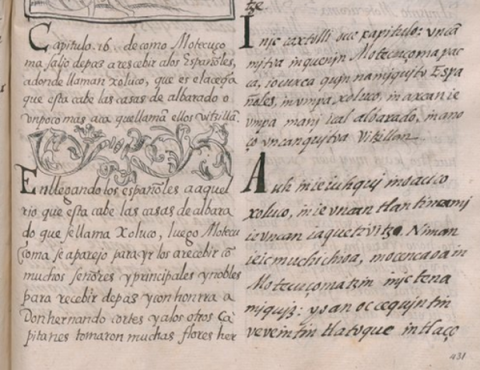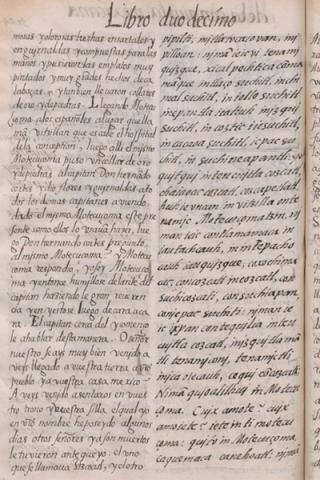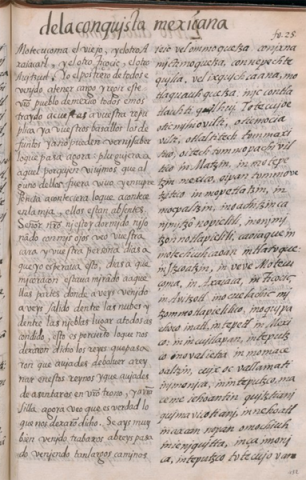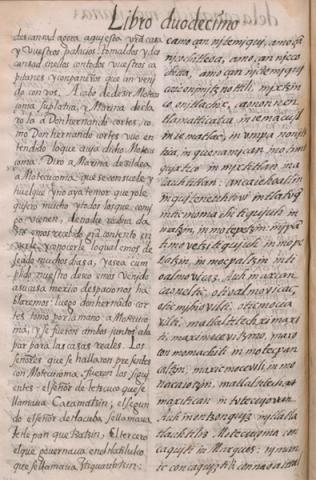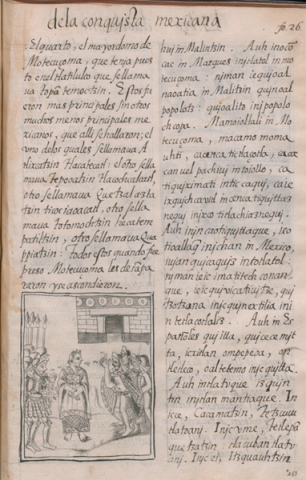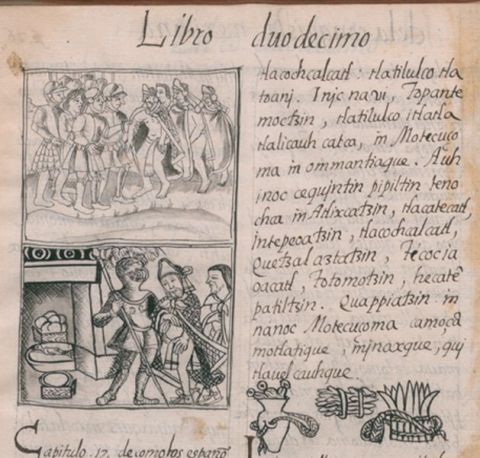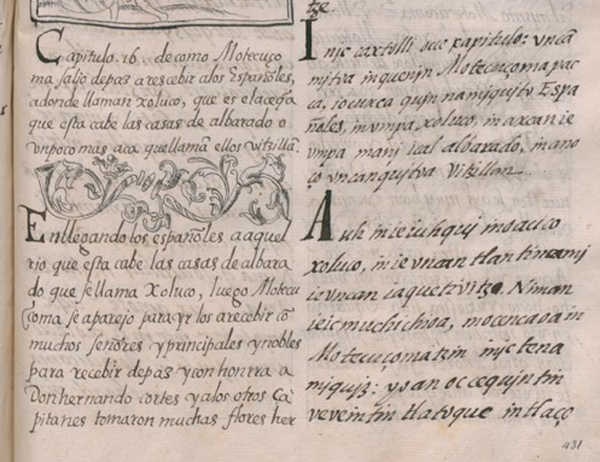 |
[Transcription of the Nahuatl (right-hand column) by James Lockhart:]
[f. 24r., cont.] Inic caxtolli occe capitulo: vncā mitoa in quenin Motecuçoma pacca, iocuxca quinnamiquito Españoles, invmpa xoluco, in axcan ie vmpa mani ical albarado, inanoço vncan quitoa Vitzillan.
Auh in ie iuhqui in oacico xoluco, in ie vncan tlantimani ie vncan iaquetivitz.* Niman ie ic muchichioa, mocencaoa in Motecuçomatzin inic tenamiquiz: yoan occequintin veveintin tlatoque in tlaço
----------
*IAQUETIVITZ. I can offer no explanation of the main verb in this construction.
|
[Translation of the Nahuatl (right-hand column) by James Lockhart:]
Sixteenth chapter, where it is said how Moteucçoma went in peace and quiet to meet the Spaniards at Xoloco, where the house of Alvarado is now, or at the place they call Huitzillan.
And when they [the Spaniards] had come as far as Xoloco, when they had stopped there, Moteucçoma dressed and prepared himself for a meeting, along with other great rulers and high nobles,
[Translation of the Spanish (left-hand column) by James Lockhart:]
Chapter Sixteen, of how Moteucçoma came out peacefully to receive the Spaniards at the place called Xoloco, which is the canal next to the house of Alvarado, or a little farther this way, what they call Huitzillan.
When the Spaniards reached that river next to the house of Alvarado, called Xoloco, Moteucçoma equipped himself to go receive them, along with many lords, leaders, and nobles. In order to give don Hernando Cortés and the other captains a peaceful and honorable reception, they took many
|
[Translation of the Nahuatl into Spanish by Fr. Bernardino de Sahagún; transcription of the Spanish (left-hand column) by James Lockhart:]
[f. 24r.] Capitulo .16. de como Motecuçoma salio de paz a rescebir a los Españoles, adonde llaman xoluco, que es el aceq̓a que esta cabe las casas de albarado o vn poco mas aca que llamā ellos vitzillā.
En llegando los españoles a aquel rio que esta cabe las casas de albarado que se llama Xoluco, luego Motecuçoma se aparejo para yrlos a recebir cō muchos señores y principales y nobles para recebir de paz y con honrra a Don hernando cortes y a los otros Capitanes tomaron muchas flores her
|
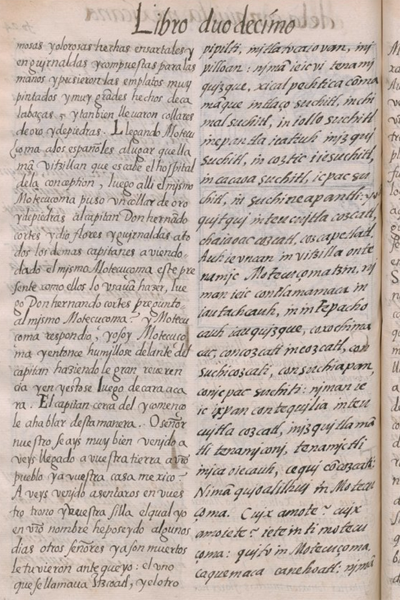 |
[Transcription of the Nahuatl (right-hand column) by James Lockhart:]
[f. 24v.] pipilti, in itlatocaiovan, in ipilloan: nimā ie ic vi tenamiquizque, xicalpechtica cōmamāque in tlaçosuchitl, in chimalsuchitl, in iollosuchitl inepantla icatiuh in izquisuchitl, in coztic iiesuchitl, in cacaoasuchitl, icpacsuchitl, in suchineapantli: yoā quitqui in teucuitlacozcatl, chaiaoaccozcatl, cozcapetlatl.
Auh ie vncan in vitzilla ontenamic Motecuçomatzin, niman ie ic contlamamaca in iautachcauh, in intepachocauh iauquizque, coxochimacac, concozcati in cozcatl,consuchicozcati, consuchiapan, conicpacsuchiti: nimanie ic ixpan contequilia in teucuitlacozcatl, in izquitlamā tli tenamiconi, tenamictli in ica oiecauh, cequi cōcozcati:
Nimā quioalilhui in Motecuçoma. Cuix amo te? cuixamo ie te? ie te in timotecuçoma:
quito in Motecuçoma, ca quemaca ca nehoatl: nimā
|
[Translation of the Nahuatl (right-hand column) by James Lockhart:]
his rulers and nobles. Then they went to the meeting. On gourd bases they set out different precious flowers; in the midst of the shield flowers and heart flowers stood popcorn flowers, yellow tobacco flowers, cacao flowers, [made into] wreaths for the head, wreaths to be girt round. And they carried golden necklaces, necklaces with pendants, wide necklaces.
And when Moteucçoma went out to meet them at Huitzillan, thereupon he gave various things to the war leader, the commander of the warriors; he gave him flowers, he put necklaces on him, he put flower necklaces on him, he girt him with flowers, he put flower wreaths on his head. Then he laid before him the golden necklaces, all the different things for greeting people. He ended by putting some of the necklaces on him.
Then [Cortés] said in reply to Moteucçoma: “Is it not you? Is it not you then? Moteucçoma?”
Moteucçoma said, “Yes, it is me.” Thereupon
[Translation of the Spanish (left-hand column) by James Lockhart:]
beautiful and fragrant flowers, in chains, wreaths, and arrangements for the hands, and they put them in very large and well-painted dishes made of gourds. They also took necklaces of gold and fine stones.
When Moteucçoma reached the Spaniards, at the place they call Huitzillan, near the Hospital of La Concepción, there Moteucçoma himself put a necklace of gold and fine stones on Captain don Hernando Cortés, and gave flowers and garlands to all the other captains.
After Moteucçoma himself had given this present, as they were accustomed to do, don Hernando Cortés asked Moteucçoma himself [if it was he], and Moteucçoma replied, "I am Moteucçoma." Then he prostrated himself before the captain, doing him great reverence, and then he raised himself face to face with the captain, very close to him. He began to speak to him in this fashion:
"O our lord, you are very welcome. You have reached your land, your settlement, your home Mexico. You have come to sit on your throne and seat, which I have possessed for some days in your name. Other lords, now dead, had it before me; one was named Itzcoatl, another
|
[Translation of the Nahuatl into Spanish by Fr. Bernardino de Sahagún; transcription of the Spanish (left-hand column) by James Lockhart:]
[f. 24v.] mosas y olorosas hechas en sartales y en guirnaldas y compuestas para las manos y pusieronlas em platos muy pintados y muy grādes s de calabaças, y tanbien lleuaron collares de oro y de piedras.
Llegando Motecuçoma a los españoles a lugar* que llamā vitzillan que es cabe el hospital de la conception, luego alli el mismo Motecuçoma puso vn collar de oro y piedras al capitan Don hernādo cortes y dio flores guirnaldas a todos los demas capitanes
aviendo dado el mismo Motecuçoma este presente como ellos lo vsauā hazer, luego Don hernando cortes pregunto al mismo Motecuçoma? y Motecuçoma respondio, yo soy Motecuçoma y entonce humillose delante del capitan haziendole gran reuerencia y enyestose luego de cara a cara. El capitan cerca del y començole a hablar desta manera.
O señor nuestro seays muy bienvenido aveys llegado a vuestra tierra a v̄r̄o pueblo y a vuestra casa mexico! Aveys venido a sentaros en vuestro trono y vuestra silla el qual yo en v̄r̄o nombre he poseydo algunos dias otros señores ya son muertos le tuvieron ante que yo: el vno que se llamaua Itzcoatl y el otro
----------
*A LUGAR. An earlier version no doubt had "al lugar" or "a un lugar" instead.
|
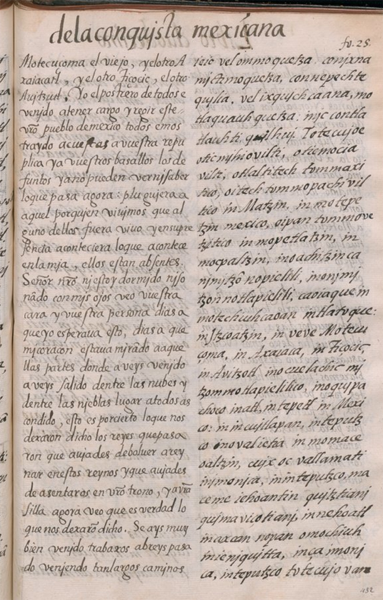 |
[Transcription of the Nahuatl (right-hand column) by James Lockhart:]
[f. 25r.] ie ic vel ommoquetza conixnamictimoquetza, connepechtequilia,* vel ixquich caana, motlaquauhquetza: inic contlatlauhti, quilhui.
Totecuioe oticmihiovilti, oticmociavilti, otlaltitech tommaxitico, o itech tommopachiviltico in Matzin, inmotepetzin mexico, o ipan tommovetzitico in mopetlatzin, in mocpaltzin, in o achitzinca nimitzōnopielili,in onimitzonnotlapielili, ca oiaque in motechiuhcaoan intlatoque: in Itzcoatzin, in veve Motecuçoma, in Axaiaca,in Tiçocic, in Avitzotl, in o cuel achic mitzommotlapielilico, in oquipachoco in atl, in tepetl in Mexico: inincuitlapan, inteputzco in ovalietia in momaceoaltzin,cuix oc vallamati in imonica, in inteputzco, ma cemeiehoantin quitztiani quimaviçotiani, in nehoatl in axcannopan omochiuh in ie niquitta, in ça imonica, inteputzco totecuiovan
----------
*CONNEPECHTEQUILIA. It appears that, as in the Spanish, the bowing should precede the standing straight.
|
[Translation of the Nahuatl (right-hand column) by James Lockhart:]
he stood up straight, he stood up with their faces meeting. He bowed down deep to him. He stretched as far as he could, standing stiff. Addressing him, he said to him:
“Oh our lord, be doubly welcomed on your arrival in this land; you have come to satisfy your curiosity about your altepetl of Mexico, you have come to sit on your seat of authority, which I have kept a while for you, where I have been in charge for you, for your agents the rulers—Itzcoatzin, the elder Moteucçoma, Axayacatl, Tiçocic, and Ahuitzotl—have gone, who for a very short time came to be in charge for you, to govern the realmof Mexico. It is after them that your poor vassal [myself] came. Will they come back to the place of their absence? If only one of them could see and behold what has now happened to me, what I now see after our lords are gone!
[Translation of the Spanish (left-hand column) by James Lockhart:]
Moteucçoma the elder, another Axayacatl, another Tiçocic, another Ahuitzotl. I have come last of all to rule and have charge of this your settlement of Mexico. We have all borne your commonwealth on our backs. Your deceased vassals can no longer see or know what is happening now. Would to the Giver of Life that one of them were alive now, and in his presence would occur what is occurring in mine; but they are absent. Our lord, I am not asleep or dreaming; with my eyes I see your face and your person. For some time I have been expecting this, for some time my heart has been looking in the direction from which you have come, having emerged from within the clouds and mists, a place hidden to all. This is surely what the kings who are gone left announced, that you would come to rule these realms and that you would assume your throne and seat. Now I see that what they left announced is true. You are very welcome; you have undergone great travails
|
[Translation of the Nahuatl into Spanish by Fr. Bernardino de Sahagún; transcription of the Spanish (left-hand column) by James Lockhart:]
[f. 25r.] Motecuçoma el viejo, y el otro Axaiacatl, y el otro Tiçocic, el otro Auitzutl. Yo el postrero de todos e venido a tener cargo y regir este v̄r̄o pueblo de mexico todos emos traydo a cuestas a vuestra republica y a vuestros basallos los defuntos ya no pueden ver ni saber lo que pasa agora: pluguiera a aquel por quien viuimos que alguno dellos fuera viuo y en su presencia aconteciera lo que acontece en la mia, ellos estan absentes. Señor n̄r̄o ni estoy dormido ni sonādo con mis ojos veo vuestra cara y vuestra persona dias a que yo esperaua esto, dias a que mi coraçon estaua mirādo a aquellas partes donde aveys venido aveys salido dentre las nubes y dentre las nieblas lugar a todos ascondido, esto es por cierto lo que nos dexaron dicho los reyes que pasaron que auia desde boluer a reynar en estos reynos y que auia desde asentaros en v̄r̄o trono, y a** v̄r̄a silla agora veo que es verdad lo que nos dexarō dicho. Seays muy bienvenido trabaxos abreys pasado veniendo tan largos caminos
----------
*A. In normal usage this word should be "en."
|
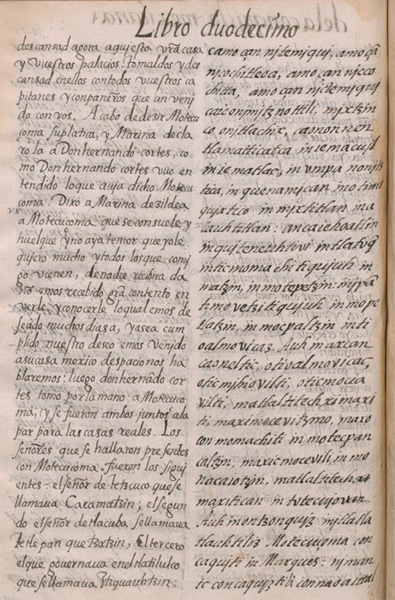 |
[Transcription of the Nahuatl (right-hand column) by James Lockhart:]
[f. 25v.] camo çan nitemiqui, amo çā nicochitleoa, amo çan niccochitta, amo çan nictemiqui caie onimitznottili, mixtzinco onitlachix, ca ononnentlamatticatca in ie macuil in ie matlac, in vmpa nonitztica, in quenamican in otimoquixtico in mixtitlan in aiauhtitlan: anca iehoatl inin quiteneuhtivi in tlatoq¯ in ticmo-machitiquiuh in matzin, in motepetzin: in ipā timovetzi-tiquiuh in mopetlatzin, in mocpaltzin in tioalmovicaz.Auh in axcan ca oneltic, otioalmovicac, oticmihiovilti, oticmociavilti, ma tlaltitech ximaxiti, ma ximocevitzino, ma xoconmomachiti in motecpancaltzin, ma xicmoceviliin monacaiotzin, ma tlaltitech maxitican in totecuiovan.
Auh in ontzonquiz in itlatlatlauhtiliz Motecuçoma concaquiti in Marques: niman ic concaquiztili connaoaittal
|
[Translation of the Nahuatl (right-hand column) by James Lockhart:]
For I am not just dreaming, nor just sleep walking, not just seeing it in my sleep. I am not just dreaming that I have seen you, have looked upon your face. For a time I have been concerned, looking toward the mysterious place from where you have come, among clouds and mist. It is so that the rulers on departing said that you would come in order to acquaint yourself with your altepetl and sit upon your seat of authority. And now it has come true, you have come. Be doubly welcomed, enter the land, go to enjoy your palace; rest your body. May our lords be arrived in the land.”
And when the speech that Moteucçoma directed to the Marqués had concluded, Marina reported it to him, interpreting it for him.
[Translation of the Spanish (left-hand column) by James Lockhart:]
in coming such a long way; rest now. Here are your home and your palaces; take them and rest in them with all your captains and companions who have come with you."
When Moteucçoma had finished giving his speech, Marina interpreted it for don Hernando Cortés. When don Hernando Cortés understood what Moteucçoma had said, he said to Marina,
"Tell Moteucçoma to console himself, relax, and not be afraid, for I and all who are coming with me like him very much; he will receive no harm from anyone. It has given us great pleasure to see him and make his acquaintance, as we have wished to do for a long time now. Our desire has been fulfilled, and we have come to his home, Mexico. We will speak at leisure."
Then don Hernando Cortés took Moteucçoma by the hand, and they went together, side by side, toward the royal palace.
The lords who were present with Moteucçoma were the following: the lord of Tetzcoco, named Cacamatzin; second, the lord of Tacuba, named Tetlepanquetzatzin; third, the governor in Tlatelolco, named Itzquauhtzin;
|
[Translation of the Nahuatl into Spanish by Fr. Bernardino de Sahagún; transcription of the Spanish (left-hand column) by James Lockhart:]
[f. 25v.] descansad agora aqui esta v̄r̄a casa y vuestros palacios: tomaldos y descansad en ellos con todos vuestros capitanes y conpañeros que an venido con vos.
Acabo de dezir Motecuçoma su platica, y Marina declarola a Don hernando cortes, como Don hernando cortes vuo entendido lo que auia dicho Motecuçoma. Dixo a Marina
dezilde a* Motecuçoma que se consuele y huelque** y no aya temor que yo le quiero mucho y todos los que comigo vienen, de nadie recibira daño emos recebido grā contento en verle y conocerle lo qual emos deseado muchos dias a, ya se a cumplido nuestro deseo emos venido a su casa mexico despacio nos hablaremos:
luego don hernādo cortes tomo por la mano a Motecuçoma, y se fueron ambos juntos a la par para las casas reales.
Los señores que se hallaron presentes con Motecuçoma fueron los siguientes: el señor de Tetzcuco que se llamaua Cacamatzin; el segundo el señor de tlacuba se llamaua Teztlepanquetzatzin, El tercero el que gouernaua en el tlatilulco que se llamaua Itzquauhtzin:***
----------
*A. The word is repeated through inadvertence.
**HUELQUE. For "huelgue."
***ITZQUAUHTZIN. The colon is inadvertently repeated at the beginning of fol. 26.
|
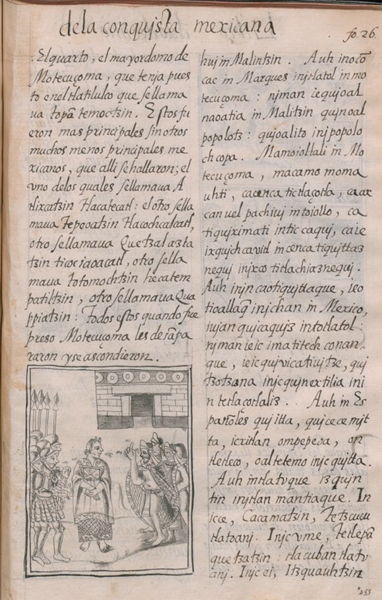 |
[Transcription of the Nahuatl (right-hand column) by James Lockhart:]
[f. 26r.] hui in Malintzin. Auh in ocōcac in Marques initlatol in motecuçoma: niman ie quioalnaoatia in Malitzin* quinoalpopolotz: quioalito in ipopolochcopa.
Ma moiollali in Motecuçoma, macamo momauhti, ca cenca tictlaçotla, ca axcan uel pachiui in toiollo, ca tiquiximati in ticcaqui, ca ie ixquich cavitl in cenca tiquit-taznequi in ixco titlachiaznequi. Auh inin ca otiquittaque, ie otioallaq¯ in ichan in Mexico, iuian quicaquiz in totlatol:
niman ie ic imatitech conanque, ie ic quivicatiuitze,quitzotzona inic quinextilia in intetlaçotlaliz. Auh in Españoles quiitta, quicecemitta, icxitlan ompepeoa, ontletleco, oaltetemo inic quitta.
Auh in tlatoque izquintin in itlan mantiaque. Inic ce, Cacamatzin, Tetzcucu tlatoani. Inic vme, Tetlepāquetzatzin: tlacuban tlatoani. Inic ei, Itzquauhtzin
----------
*MALITZIN. Syllable-final nasals were often omitted in Nahuatl speech and writing. Thus this form instead of the usual "Malintzin" is probably more than a simple mistake.
|
[Translation of the Nahuatl (right-hand column) by James Lockhart:]
And when the Marqués had heard what Moteucçoma had said, he spoke to Marina in return, babbling back to them, replying in his babbling tongue:
“Let Moteucçoma be at ease, let him not be afraid, for we greatly esteem him. Now we are truly satisfied to see him in person and hear him, for until now we have greatly desired to see him and look upon his face. Well,now we have seen him, we have come to his homeland of Mexico. Bit by bit he will hear what we have to say.”
Thereupon [the Spaniards] took [Moteucçoma] by the hand. They came along with him, stroking his hair to show their good feeling. And the Spaniards looked at him, each of them giving him a close look. They would start along walking, then mount, then dismount again in order to see him.
And as to each of the rulers who went with him, they were: first, Cacamatzin, ruler of Tetzcoco; second, Tetlepanquetzatzin, ruler of Tlacopan; third, the Tlacochcalcatl Itzquauhtzin,
[Translation of the Spanish (left-hand column) by James Lockhart:]
and fourth, the majordomo that Moteucçoma had placed in Tlatelolco, named Topantemoctzin. These were the highest leaders, in addition to many other Mexica leaders of lower rank who were present, one of whom was named Adixcatzin, Tlacateccatl; another named Tepehuatzin, Tlacochcalcatl; another Quetzalaztatzin, Ticocyahuacatl; another named Totomochtzin Ecatempatiltzin; another named Quappiatzin. When Moteucçoma was taken prisoner all these abandoned him and hid themselves.
|
[Translation of the Nahuatl into Spanish by Fr. Bernardino de Sahagún; transcription of the Spanish (left-hand column) by James Lockhart:]
[f. 26r.] El quarto, el mayordomo de Motecuçoma, que tenia puesto en el tlatilulco que se llamaua topātemoctzin. Estos fueron mas principales mexicanos, sin otros muchos menos principales mexicanos, que alli se hallaron; el vno de los quales se llamaua Atlixcatzin Tlacatecatl: el otro se llamaua Tepeoatzin Tlacochcalcatl, otro se llamaua Quetzalaztatzin ticociaoacatl, otro se llamaua Totomochtzin hecatempatiltzin, otro se llamaua Quappiatzin: Todos estos quando due preso Motecuçoma les desāpararon y se ascondieron.
|
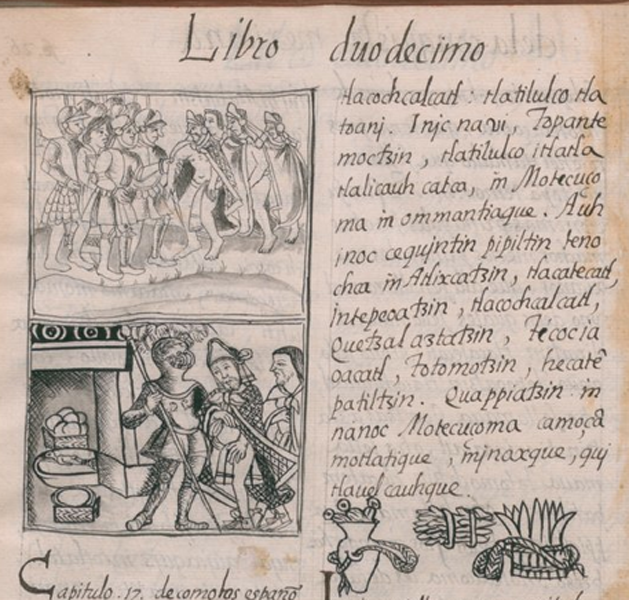 |
[Transcription of the Nahuatl (right-hand column) by James Lockhart:]
[f. 26v.] tlacochcalcatl: tlatilulco tlatoani. Inic navi, Topante-moctzin, tlatilulco itlatlatlalicauh catca, in Motecuçoma in ommantiaque. Auh in oc cequintin pipiltin tenochcain Atlixcatzin, tlacatecatl, in tepeoatzin, tlacochcalcatl,Quetzalaztatzin, Ticociaoacatl, Totomotzin, hecatēpatiltzin, Quappiatzin: inn anoc Motecuçoma camo çā motlatique, minaxque, quitlauelcauhque.
|
[Translation of the Nahuatl (right-hand column) by James Lockhart:]
ruler of Tlatelolco; fourth, Topantemoctzin, Moteucçoma’s storekeeper in Tlatelolco. These were those who went. And the other Tenochca noblemen were Atlixcatzin, the Tlacateccatl; Tepehuatzin, the Tlacochcalcatl; Quetzalaztatzin, the Ticocyahuacatl; Totomotzin; Ecatenpatiltzin; and Quappiaztzin. When Moteucçoma was made prisoner, they not only hid themselves and took refuge, they abandoned him in anger.
[Translation of the Spanish (left-hand column) by James Lockhart:]
(intentionally blank)
|
[Translation of the Nahuatl into Spanish by Fr. Bernardino de Sahagún; transcription of the Spanish (left-hand column) by James Lockhart:]
[f. 26v., la parte de arriba; dos dibujos; sin texto en español]
|
